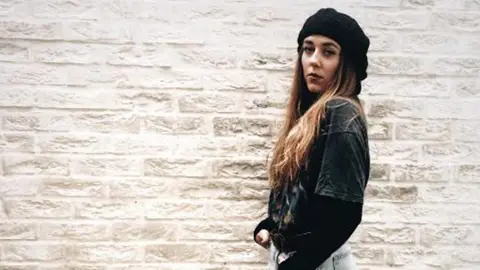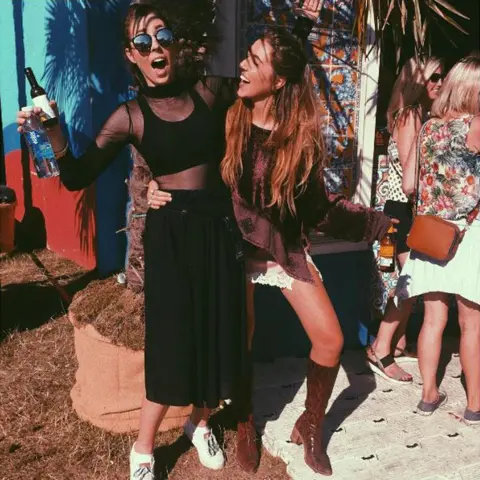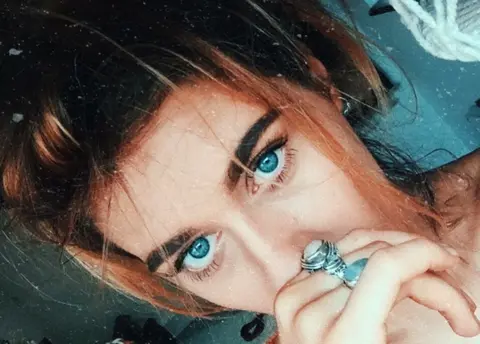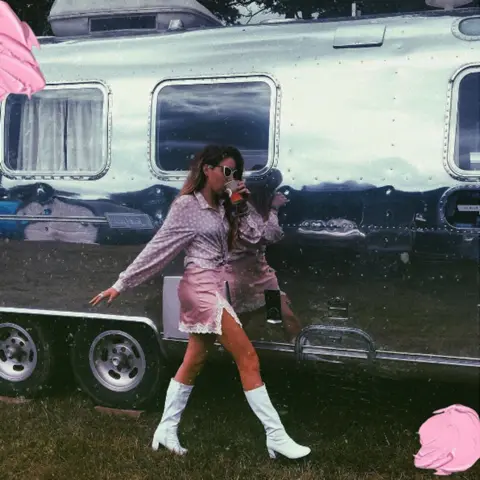Upskirting - how one victim is fighting back
 Gina Martin
Gina MartinWhen a man took an upskirt photograph of Gina Martin at a music festival she went straight to the police. And when they closed her case, she began a petition to get it reopened, as she explains here.
On 8 July 2017, I was standing in the crowd at the British Summer Time music festival in London's Hyde Park having a laugh with my big sister and waiting for The Killers to take the stage. Two men were standing next to us, and after offering us some chips (and me accepting a couple) they became incredibly creepy.
One of the men - with dark hair - was worse than his taller blond friend. He constantly asked me questions, I caught him looking me up and down and he was laughing and joking with his friend about me. Then he rubbed up against me. I think that's when it happened.
At some point he put his phone between my legs, positioned his camera up my skirt and took pictures of my crotch in broad daylight.
 @beaniegigi
@beaniegigi At the time I had no idea what he had done. My sister and I were excitedly waiting to see a band we've loved since we were teenagers. But while we were watching the stage I saw something out of the corner of my eye. The tall, blond guy was looking at something on his phone and laughing. It was my crotch covered by a thin strip of underwear. Even though it was a small picture, I knew it was me straight away.
I snatched the phone out of his hand and started shouting that he'd taken a photo up my skirt. He screamed back at me - towering over me and pointing in my face - that it was a picture of the stage. Next, he grabbed hold of my shoulders and pushed me, demanding I give him his phone back. I couldn't loosen his grip so I made eye contact with as many people around me as I could, shouting: "Help me. Help me!"
I slipped the phone into the hand of a girl next to me who I had been chatting to minutes earlier. He stood over her aggressively. "Give me the phone," he spat. She refused.
I caught the eye of a young guy who was standing near me: "Run!" he said. So I did.
I grabbed the phone back and bolted through the crowd, crying, and appealing to people to let me through. I ran as fast as I could, but could hear him right behind me. "Give me my phone!" he screamed.
I made a bee-line for the security staff and as soon as they saw the state I was in - and the man running after me - they formed a protective circle around me. He ran into them, flailing, trying to reach me and screaming that he hadn't taken the picture.
I tried to calm him down but it wasn't working. The security guard told me to slip the phone into his back pocket. I did.
We waited for a minute or two for the police to come, and I asked if we could stand nearer the crowd and sing. I wanted to pretend this wasn't happening. Security allowed us to move about three metres away from them. We stood near the security gate, hugged each other and forced ourselves to dance to The Killers' first song. In reality I was just blubbing through every word and my sister was trying not to cry.
When the police officers arrived - a man and a woman - I did my best to explain what had happened, even though I was a complete mess. They were kind and compassionate. One of them told me I "should be able to go to a festival in 30-degree heat and wear a skirt without worrying about this happening".
They separated me and the blond guy and questioned him for a minute or two. When they came back over to me the male police officer was apologetic - he told me, "Unfortunately, I've had to look at the picture. It shows more than you'd like… but it's not graphic. So there's not much we can do because you can't see anything bad. I'm going to be honest - you might not hear much from us."
He asked me if I wanted to give a statement and I didn't feel I could at the time. I was standing in the middle of a field, crying, and I could hardly think. I just wanted to enjoy what was left of my (very expensive) night out and worry about it later.
 @beaniegigi
@beaniegigi The police finished by reassuring me that they had "made him delete the picture". At this point, because of the mess I was in, it didn't occur to me that this was my evidence.
The photograph wasn't considered graphic because I had knickers on - if I had chosen not to wear any underwear it might have been dealt with entirely differently - but I don't see how what I was wearing should affect their response.
Five days later I was sitting on a bus to the Latitude festival with a bag of clothes I'd spent far too long considering. Should I pack skirts, or was that stupid after what just happened?
I received a call from the police, who told me that the case had been closed but they once again assured me that they had deleted the picture. With a clear head and time to think about it, I couldn't believe what I was hearing. This wasn't good enough.
 @beaniegigi
@beaniegigi A few days later I posted a status update on Facebook with a picture of the guys, after realising they were in the background of a picture of me and my sister at the gig. I wanted to embarrass them. I wanted someone to tell me who they were.
My post went viral within days, on both Twitter and Facebook. Other women shared similar experiences with me and that's when I realised this was a bigger problem.
I began receiving messages, some of support and some of hate.
Some people told me to wear a longer skirt, to stop trying to get attention and to stop lying. Others told me I was doing it for publicity and that it was my own fault I'd been targeted.

Find out more
- An upskirt photo is a photo taken up someone's skirt without consent
- Such photos may end up on dedicated upskirt websites - which are big business
- Some perpetrators have been known to use a camera embedded in the top of their shoe
- To discourage covert photos, phones sold in Japan have a shutter sound that cannot be disabled
- Upskirting is an offence in Scotland under the Sexual Offences (Scotland) Act 2009
- In England, Wales and Northern Ireland it's harder to prosecute
Source: Prof Clare McGlynn

I started a petition with Care2 to get my case reopened (it now stands at more than 50,000 signatures).
I struggled to get anything done at work that week. For seven days I was being trolled and receiving awful messages.
At one point I became a meme - teenagers tagged themselves in my post with phrases like "Viva la upskirters!" and crying-laughing emojis. Their friends replied with "Lol. Slag." I struggled to sleep, from the attention and stress, and I lost my appetite. I don't think you really know how victim-blaming affects you until you've been there. It's awful.
 Facebook
Facebook I started to research how I could prosecute, and through conversations with lawyers, friends and organisations such as "Safe gigs for Women" and "Girls Against", I found out that upskirt photos aren't specifically listed as a sexual offence in England and Wales. Perpetrators don't often get charged with voyeurism, either - voyeurism laws only protect victims if they're in a private place like a changing room or at home. But I was at a festival - a public place.
I found out that the one law I could charge under was an old common law called "outraging public decency" - a law that states something lewd or indecent happened in public and at least two people saw it. Ironically, it is usually applied to flashers. So, to put it plainly, the only law that protects a victim of upskirting in England and Wales is one that worries about what the public saw, not the victim who's been harassed.
It's an old law too - victims don't push for it because they don't know about it. If they had known about that law would the police have dealt with my case differently?
Something has to change here, and that's why I'm campaigning to make upskirt photography a sexual offence. Scotland just did it. So we could too.
My case has since been reopened and I hope that the men are prosecuted. But this isn't just about my case. My next step is to have the laws amended so that upskirt photos are listed as a sexual offence and a "victim crime", not a public nuisance.

Statement from the Metropolitan Police:
The Met takes allegations of voyeurism seriously and does and will investigate them thoroughly. We use a range of policing tactics and deploy officers on specific operations to target this sort of criminal behaviour based on intelligence. We understand that it can be incredibly invasive and distressing for those that this happens to.
In this specific case we believed the allegation had originally been dealt with in line with the victim's wishes. We have subsequently recontacted the victim and inquiries are ongoing.

Listen to Gina Martin on Woman's Hour on BBC Radio 4

